The BA in Journalism program prepares its students to be well-trained communicators, providing them with the practical, technical, and language skills necessary to develop Kazakhstan’s media environment. The Bachelor of Journalism is a four-year program that primarily enrolls recent high school graduates who want to pursue careers in journalism, public relations, advertising, broadcasting, media management and communication.
The program is supported by a unique and well-equipped media laboratory that offers hands-on experience in digital journalism and public relations.
- Programs prepare students for work or further study at the graduate level;
- Opportunities to work for campus media;
- Focus on professional experience through internships and production courses
Our Faculty
The BAJ faculty includes media professionals and well-trained academics from Kazakhstan, Europe, and North America who actively conduct research. All full time professors publish internationally.
National ratings and International accreditation
- Nationally ranked in top 3 for “Journalism” programs by the National Ranking of Educational Programs: Bachelor Programs (IQAA RK) in 2020
- Internationally accredited degree confirmed by the Foundation for Business Administration Accreditation (FIBAA), Germany
Curriculum
To earn a The Bachelor of Journalism a student must complete 146 credits/240 ECTS.
| Credits | ECTS | |
| General Education Requirements | 36 | 56 |
| Program Foundation Requirements | 68 | 112 |
| Program Required Courses | 36 | 60 |
| Final Attestation | 6 | 12 |
| Total Required for Graduation | 146 | 240 |
Students should choose the General Education courses with the assistance and advice of the academic advisors. The following are some guidelines for students in the BAJ program.
General Education Requirements can be found in the General Education section of the Catalog.
Program Foundation Required Courses (32 credits/52 ECTS)
| Course Code | Course Title | KIMEP Credits | ECTS | Prerequisites |
| ENG1100 | Academic Speaking | 3 | 5 | |
| ENG1121 | Academic Reading and Writing II | 3 | 5 | |
| JMC3616.2 or JMC3615.2 | Writing for Russian/Kazakh Media | 2 | 3 | None |
| JMC2615 | Media Writing | 3 | 5 | None |
| JMC 4614 | Media Analysis | 3 | 5 | JMC2605 |
| JMC2607 | Ethical and Legal Issues in Media and Communication | 3 | 5 | None |
| JMC2605 | Media and Society | 3 | 5 | None |
| JMC 2612 | Internet and Society | 3 | 5 | None |
| GEN/PAD 2700.2 |
Fundamentals of Sociology | 2 | 3 | |
| GEN/POL 2701.2 |
Fundamentals of Political Science | 2 | 3 | |
| GEN1704.2 /ECN1101.2 |
Introduction to Economics | 2 | 3 | |
| JMC3611 | Internship I | 3 | 5 | JMC2605 |
| TOTAL: | 32 | 52 |
Program Foundation: Elective Courses – for more information please consult with CSS Program Coordinator at css_coordinator@kimep.kz.
Majors and minors
The Department of Journalism offers the following majors (specializations) to students:
- Digital Journalism
- Public Relations
And the following minors:
- Communications
- Media and Politics
JMC 1606 English for Media Communication I
Prerequisites: None
This course will develop students’ skills for journalistic and academic writing. Topics to be covered include: Proper citations (using both the conventions of journalism and of APA academic style); identifying and avoiding plagiarism; proper use and presentation of quotations; and clear writing styles for journalism and academic writing. Students will be introduced to good examples of academic and journalistic writing, and will produce their own examples using each style.
JMC 2604 Computer Design and Editing
Prerequisites: None
In this course students will learn the fundamentals of computer applications used to design and edit journalistic materials. It provides students with the skills needed to edit stories and design newspaper/magazine pages. Topics include drawing setup, drawing and editing techniques, pictorial drawing, how to master dimensions, printing, plotting, and basic 3D modeling.
JMC 2605 Mass Media and Society
Prerequisites: None
This course surveys how media and mass communication impact society and its economic and political development. It is designed to acquaint students with theory and research in the mass communication field. It examines the relationship between individuals and the media and explores the role of and impact of media in progressively larger social systems. (Students who have taken GED2610 Mass Communications and Society should not take this course.)
JMC 2607 Ethical and Legal Issues in Mass Communication
Prerequisites: None
The course is designed to help journalists and communication professionals understand their rights and responsibilities. The course explores legal and ethical aspects in the press and in the public relations industry in Kazakhstan (local practice) and abroad (international practice). The ethical part of the course addresses news manipulation, bias, unfairness, plagiarism, fabrication, conflict of interest. The legal part introduces Press law and key concepts of Kazakhstani legal system related to regulation of mass and online communication.
JMC 2608/GEN2812 Introduction to Public Relations
Prerequisites: None
This course is designed to provide students with introductory theoretical knowledge of public relations and beginning practical experience. It surveys the basics of the PR process and PR-related communication theories. It also introduces students to PR strategies and tactics and discusses public relations professional ethics. The course offers students an opportunity to use some of the strategies and tactics that public relations practitioners have actually used in their campaigns.
JMC 2611 Introduction to Journalism
Prerequisites: None
The course provides an introduction to journalism and its role in society. Topics of exploration include: journalism and democratic society, globalization and world trends, and professional practices. Students are introduced to key concepts and issues in the field.
JMC 2612 New Information Technologies
Prerequisites: None
This practicum course is concerned with new information technologies and the impact they are having on journalism and related fields as well as on society at large. Students will develop critical understanding and practical skills related to network digital information technologies.
JMC 3201 Media Writing
Prerequisites: None
This course emphasizes news writing and reporting for print media. The course covers news values, basic news reporting skills, news story structure, AP style, and grammar and usage, and basic news reporting skills. Students will learn how to write news stories on a variety of subjects and issues. The course also examines ethical and legal issues related to the practice of journalism.
JMC 3608 Journalism in Kazakhstan and CIS
Prerequisites: None
The purpose of this course is to examine news media in Kazakhstan and other CIS countries, including regional problems that relate to journalism. The course surveys different media outlets in Kazakhstan, examines their specifics and introduces their types.
JMC 3609 Principles of Media Management
Prerequisites: None
This course introduces the basic principles of media management. It reviews the organization of radio, TV, magazine and newspaper enterprises. It also deals with case studies of media organizations.
JMC 3615.01 Writing for Russian Language Media
Prerequisites: None
This course is designed to develop help students apply skills in writing for media in the Russian language. Students will study the language of mass media and access a range of sources in the Russian-language media. The material of the course includes understanding themes and vocabulary of mass media and applying principles of Western style media writing in a Russian language environment. The course will focus on practical written assignments designed to build students’ competence in writing professionally in Russian in order to prepare them for entering the local media workforce.
JMC 3615.02 Writing for Kazakh Language Media
Prerequisites: None
This course is designed to develop help students apply skills in writing for media in the Kazakh language. Students will study the language of mass media and access a range of sources in the Kazakh-language media. The material of the course includes understanding themes and vocabulary of mass media and applying principles of Western style media writing in a Kazakh language environment. The course will focus on practical written assignments designed to build students’ competence in writing professionally in Kazakh in order to prepare them for entering the local media workforce.
JMC 3622 Print Journalism
Prerequisites: JMC 3201 Media Writing
This course covers newspapers and magazine writing. It introduces students to the writing, editing, layout, and production of magazines and newspapers. The course also teaches students the fundamentals of newsgathering, news writing, interviewing techniques, news editing and design.
Program Foundation Elective Courses
| Course Code | Course Title | Credits |
|---|---|---|
| JMC 4701.4 | Communication Research | 4 |
| JMC 2609 | Psychology in Communication | 3 |
| JMC 2704 | Persuasive Communications | 3 |
| JMC 2703 | Photojournalism | 3 |
| JMC3211 | Editing | 3 |
| JMC 4615 | Online Multimedia Technologies | 3 |
| JMC 4705 | Introduction to Documentary | 3 |
| JMC 4707 | Broadcast Production and Editing | 3 |
| JMC 4706 | Creative Workshop | 3 |
| JMC 3707 | Broadcasting in Russian (Kazakh) | 3 |
| JMC 4708 | Independent Studies in Communications | 3 |
| JMC 3709 | Audio Production | 3 |
| JMC 5610 | Advanced News Editing | 3 |
JMC 2609 Psychology in Communication
Prerequisites: None
This course examines behavior and experience as it relates to the journalist or public relations practitioner. Major topics covered include personality factors, intelligence, perception, motivation, problem solving, social relationships and interpersonal communication. Students will gain an understanding of the importance these factors have for the mass media professional.
JMC 2703 Photojournalism
Prerequisites: None
This course covers the key concepts and skills of digital photography. It explains composition, exposure, and lighting as well as such advanced techniques as working with subjects, producing a professional portfolio, and postproduction. By understanding the traditions and current practices of successful photographers, students learn how to work as a photojournalist, while exploring and developing their own vision. Local professional photographers visit the class to ensure a realistic, stimulating view of photographic skills and options. This practical course treats visual journalism as the basis for other important categories in the field, such as commercial, landscape, fine art and portrait photography.
JMC 2704 Persuasive Communications
Prerequisites: None
This course covers key principles, practices, and contexts of persuasion in the current era of changing mass communication patterns, in both traditional and online communication spheres. Its general focus can be summarized as the “applied psychology of messaging.” We will cover many key concepts of persuasion, but will mostly focus on practical ways to deal with persuasion. Most of the class will involve learning, critiquing, using and practicing major advanced persuasion techniques. Analytical and creative thinking will be integrated into most projects. The course will also consistently consider the ethical aspects of using persuasion, in terms of individuals, groups and societies.
JMC 3211 Editing
Prerequisites: None
This course acquaints students with the philosophy of news editing and gives them extensive practice in the skills required. It covers big-picture editing – whether a story is well organized, whether information is missing that makes a story incomplete, whether the tone of the story is appropriate and so on. It also covers small-picture editing – paragraph transitions, grammar, spelling, punctuation and the like.
JMC 3707 Broadcasting in Russian
Prerequisites: None
Broadcasting in Russian is ideally taken after Broadcast Journalism (1) to continue building basic video technical skills and broadcast journalism skills initiated in the previous course, and (2) to better prepare students for potential employment especially within the dominant Russian-speaking broadcast/video industry. Students will continue developing on-camera and behind-camera skills, including news/script writing, video editing, and directing skills. They will employ their video/broadcast skills in real and/or realistic settings, producing news and informational programming.
JMC 4615 Online Interactive, Multimedia Technologies
Prerequisites: None
This course introduces students to online interactive, multimedia technologies including learning management, conferencing, video sharing, social networking multimedia, video creation and editing, and viral marketing.
JMC 4701 Communication Research
Prerequisites: None
Communication Research is an undergraduate level course designed to introduce the key research areas and gaps in communication studies; major theories of communication research, and basic research methods. The course aims to prepare students to understand the research process, to interpret research reports, and to conduct their own basic research projects.
JMC 4705 Introduction to Documentary
Prerequisites: None
This elective course is designed for undergraduate students. During the first three weeks the course will revise the basics of visual writing, different types/angles of shots, specifics of vocal delivery. The course work involves developing story ideas, on-tape interviewing, reporting, writing, video editing and on-air delivery of the script of the documentary. The final outcome of the coursework will be a production of an individual documentary piece. This course is an excellent opportunity to produce original work for student’s future portfolio.
JMC 4707 Broadcast Production and Editing
Prerequisites: None
Broadcast Production and Editing is an elective course designed for undergraduate students of journalism and mass communication. The course aims to introduce basic and advanced audio and video editing skills, vocal delivery techniques, audio and video package production. The course will showcase the best sound, image and editing experiments from the field. For students this course will offer an opportunity to apply their creativity and original interpretations in producing and editing for broadcast media.
JMC 4708 Broadcast Public Speaking
Prerequisites: None
This course will help students improve their public speaking skills. The course will teach students how to perfect pronunciation, vocal delivery, pitch, intonation and fluctuation of the voice. It will also cover rhetoric and stylistic rules of writing to the ear. The theory will also prepare students to be effective public speakers on air in various genres.
Major in Media Management
Major Required Courses
| Course Code | Course Title | Credits |
|---|---|---|
| JMC 3623 | Broadcast Journalism | 3 |
| JMC 4613.2 | Online Journalism | 2 |
| JMC 3611 | Internship I | 3 |
| JMC 3612 | Internship II | 3 |
| JMC 4070.2 | Thesis | 2 |
| JMC 4080 | State Examination | 1 |
| JMC4601 | Advertising and Media Sales | 3 |
| JMC 4209 | Public Relations Management and Strategies | 3 |
| JMC 4611.1 | Media Management Professional Project | 3 |
| JMC5630 | Political Communication | 3 |
| JMC 4690 | Special Topics in Journalism and Mass Communication | 3 |
| JMC 4614 | Media Analysis | 3 |
JMC3611 Internship
Prerequisites: JMC 2605 Mass Media and Society
This course will help students to develop marketable skills, which they can later apply in a professional setting, and begin career networking. The department, together with the internship supervisor, will evaluate students’ performance. Course may be retaken for credit with departmental permission.
JMC3612 Internship II
Prerequisites: JMC 2605 Mass Media and Society
This course offers additional training in the student’s chosen field. Students may continue a previous internship or choose a new field of study. The course is designed to provide hands-on knowledge of the field and provide the opportunity to network.
JMC3623 Broadcast Journalism
Prerequisites: JMC 3201 Media Writing
This course provides students with theoretical and practical knowledge of television production. It examines gathering, evaluating, writing, and delivering broadcast news copy. The emphasis for the course is on writing broadcast news. The course teaches students to write news stories that are accurate, clear, interesting, and concise.
JMC 4070 Thesis
Prerequisites: JMC 4701 Communication Research
Students will write an undergraduate thesis on independent research undertaken in consultation with a faculty advisor, who may specialize in the student’s potential thesis topic. Students must submit a proposal and obtain the written approval of the faculty advisor.
JMC 4209 Public Relations Management and Strategies
Prerequisites: JMC 2608 Introduction to Public Relations
The course examines the management function of PR, the process of research, planning, communication and evaluation in the field. During the course, students discuss both real and hypothetical PR cases. The course provides students with knowledge and skills to develop strategic communication plans using public relations techniques and tools. It discusses the specifics of different types of PR such as business, non-profit and government, among others
JMC 4601 Advertising and Media Sales
Prerequisites: None
This course examines advertising and promotional principles and their application in mass marketing. It also analyzes advertising media and the preparation of advertising campaigns. Case studies of advertising production will be examined and students will receive hands-on experience.
JMC 4611.01 Media Management Professional Project
Prerequisites: JMC 4601 Advertising and Media Sales and JMC 4209 PR Management and Strategies
Students will complete newspaper, TV/Radio projects under supervision of an instructor from the Department of Media and Communications. To enroll in the course students must have senior standing in the journalism/mass communication program.
JMC 4613 Online Journalism
Prerequisites: none
This practicum course introduces students to planning, designing, creating, and managing a complex news or informational website using an advanced content management system. Students will produce an online publication with multi-media content.
JMC 4614 Media Analysis
Prerequisites: JMC 2605 Media and Society
This course demonstrates how and why to analyze a wide range of media materials. Students will use a variety of media analysis techniques to investigate the production of media messages.
JMC 4690 Special Topics in Journalism and Communication
Prerequisites: None
Generally taught in seminar format, the theme of this course will vary depending upon faculty expertise, departmental priorities and student needs. The course can be repeated for credit if the topic changes.
Major Elective Courses
| Students must choose any 3 (three) of major electives courses: | ||
| JMC 3603 | Business News | 3 |
| JMC 5612 | Advanced Media Writing | 3 |
| JMC 5705 | Brand/Image Management | 3 |
| JMC 4702 | Government Media Relations | 3 |
| JMC 4708 | Broadcast Public Speaking | 3 |
| JMC 4713 | Persuasive Visual Communication | 3 |
| JMC 5622 | Advertising Writing, Layout and Strategies | 3 |
| JMC 5704 | Persuasive Communication | 3 |
| TOTAL | 9 | |
JMC 3603 Business News
Prerequisites: None (Previous Title: Business Communication)
This course covers how journalists write and edit business stories, and how business people can use their knowledge of journalists’ practices and values to get stories about their enterprises published. It looks at hard-news stories, such as company acquisitions, expansions or layoffs, executive changes, new products, earnings reports and the like. It also covers business feature stories, such as innovative company research, company philanthropy and profiles of interesting company executives.
JMC 4708 Broadcast Public Speaking
Prerequisites: None
This course will help students improve their public speaking skills. The course will teach students how to perfect pronunciation, vocal delivery, pitch, intonation and fluctuation of the voice. It will also cover rhetoric and stylistic rules of writing to the ear. The theory will also prepare students to be effective public speakers on air in various genres.
Major in Public Relations
Major Required Courses
| Course Code | Course Title | Credits |
|---|---|---|
| JMC 3623 | Broadcast Journalism | 3 |
| JMC 4613 | Online Journalism | 2 |
| JMC 3611 | Internship I | 3 |
| JMC 3612 | Internship II | 3 |
| JMC 4070 | Thesis | 2 |
| JMC 4080 | State Examination | 1 |
| JMC 4703 | Crisis Communication | 3 |
| JMC 4209 | Public Relations Management and Strategies | 3 |
| JMC 4611.02 | PR Professional Project | 3 |
| JMC4201 | Advanced Media Writing | 3 |
| JMC 4690 | Special Topics in Journalism and Mass Communication | 3 |
| JMC 5704 | Persuasive Communication | 3 |
JMC3611 Internship
Prerequisites: JMC 2605 Mass Media and Society
This course will help students to develop marketable skills, which they can later apply in a professional setting, and begin career networking. The department, together with the internship supervisor, will evaluate students’ performance. Course may be retaken for credit with departmental permission.
JMC3612 Internship II
Prerequisites: JMC 2605 Mass Media and Society
This course offers additional training in the student’s chosen field. Students may continue a previous internship or choose a new field of study. The course is designed to provide hands-on knowledge of the field and provide the opportunity to network.
JMC3623 Broadcast Journalism
Prerequisites: JMC 3201 Media Writing
This course provides students with theoretical and practical knowledge of television production. It examines gathering, evaluating, writing, and delivering broadcast news copy. The emphasis for the course is on writing broadcast news. The course teaches students to write news stories that are accurate, clear, interesting, and concise.
JMC 4070 Thesis
Prerequisites: JMC 4701 Communication Research
Students will write an undergraduate thesis on independent research undertaken in consultation with a faculty advisor, who may specialize in the student’s potential thesis topic. Students must submit a proposal and obtain the written approval of the faculty advisor.
JMC 4209 Public Relations Management and Strategies
Prerequisites: JMC 2608 Introduction to Public Relations
The course examines the management function of PR, the process of research, planning, communication and evaluation in the field. During the course, students discuss both real and hypothetical PR cases. The course provides students with knowledge and skills to develop strategic communication plans using public relations techniques and tools. It discusses the specifics of different types of PR such as business, non-profit and government, among others.
JMC 4611.02 PR Professional Project
Prerequisites: JMC4703 Crisis Communication and JMC 4209 PR Management and Strategies
Students will complete PRprojects under supervision of an instructor from the Department of Media and Communications. To enroll in the course students must have senior standing in the journalism/mass communication program.
JMC 4703 Crisis Communication
Prerequisites: None
Students will learn how PR can prevent an organizational crisis and how to handle it when it occurs. This course is designed to prepare future public relations practitioners for handling crisis situations within their companies. It familiarizes PR students with crisis dynamics and major techniques of coping with crisis. The course cultivates in future PR practitioners an ability to see signs of potential crises and prevent them at their initial “warning.
JMC 4201 Advanced Media Writing
Prerequisites: JMC 3201 Media Writing
This course will offer instruction in advanced news writing techniques for newspapers and magazines; these include feature articles, investigative pieces and coverage of government, including speeches by officials and meetings of government agencies. Students will travel off-campus to cover news events.
JMC 4209 Public Relations Management and Strategies
Prerequisites: JMC 2608 Introduction to Public Relations
The course examines the management function of PR, the process of research, planning, communication and evaluation in the field. During the course, students discuss both real and hypothetical PR cases. The course provides students with knowledge and skills to develop strategic communication plans using public relations techniques and tools. It discusses the specifics of different types of PR such as business, non-profit and government, among others.
Major Elective Courses
| JMC3605 | Political Communication | 3 |
| JMC 3603 | Business News | 3 |
| JMC 4614 | Media Analysis | 3 |
| JMC 4704 | Brand/Image Management | 3 |
| JMC 4702 | Government Media Relations | 3 |
| JMC 4708 | Broadcast Public Speaking | 3 |
| JMC 4713 | Persuasive Visual Communication | 3 |
| JMC 5622 | Advertising Writing, Layout and Strategies | 3 |
JMC 3605 Political Communication
Prerequisites: None
This course covers the development and techniques of modern political communication. It examines how politicians or government officials can best frame issues to get other officials and the public to buy into their views. It also looks at the importance of communication in a political campaign – and how best to communicate to win or hold office. Finally, because so much of the crafting of political communication is based on polling, it looks at how political polling is done and how important it is.
JMC 3708 Independent Studies in Communications
Prerequisites: None
This course allows students essentially to write their own syllabus by preparing their own contract of learning goals, activities and outputs. In so doing, students are able to explore areas and develop skills they feel are important to their future. For some, their activities, such as working on a student publication, may be more experiential in nature. For other students, the activities may involve the exploration of topics not covered extensively in scheduled courses, such as movie script or magazine writing. And for yet other students, their independent studies may involve readings and research aimed at completing their required thesis. All students, however, will meet in regular seminar-style classes where they will make regular presentations on topics related to their independent studies and participate in general discussion.
JMC 4704 Brand/Image Management
Prerequisites: None
Image and Brand Management course discusses essential components of building a strong brand and impeccable image. The course helps students to learn how to create, maintain, and possibly regain an appropriate image of themselves in the eyes of stakeholders. Students will study theories and concepts that are crucial to organization’s well-being, including credibility, identity, image, and reputation. The objective of this course is to master the foundational principles of image and brand management and apply this knowledge to enhance personal or organizational image.
JMC 4614 Media Analysis
Prerequisites: JMC 2605 Media and Society
This course demonstrates how and why to analyze a wide range of media materials. Students will use a variety of media analysis techniques to investigate the production of media messages.
JMC 3603 Business News
Prerequisites: None (Previous Title: Business Communication)
This course covers how journalists write and edit business stories, and how business people can use their knowledge of journalists’ practices and values to get stories about their enterprises published. It looks at hard-news stories, such as company acquisitions, expansions or layoffs, executive changes, new products, earnings reports and the like. It also covers business feature stories, such as innovative company research, company philanthropy and profiles of interesting company executives.
Scholarship opportunities
There are many merit-based scholarship opportunities for Kazakhstani and international students.
While studying at KIMEP University, students may also apply for part-time positions available on the University campus.
If you would like to apply for a scholarship, contact the Office of Financial Aid. .
Tuition & Fees
Study abroad opportunities
One- or two-semester exchange programs with many international partner universities offer students the opportunity to discover the world. Credits earned abroad count towards KIMEP degrees.
Innovations
We are proud to announce a new course “Model UN” in collaboration with UN Kazakhstan starting from Spring 2017 semester.
Our students enjoy
• A unique atmosphere of academic freedom, international outreach and quality education.
• Internships in the leading Kazakhstani media outlets, international organizations, state bodies and top PR firms.
CAREERS
Employment and Internship Prospects
We prepare out students for careers including:
- Digital journalist
- Public relations manager
- Communication specialist
- Editor
- Social Media Marketer
- Media production specialist
- News anchor
- Copywriter
- Digital producer
- Event manager, among many others.
With a 100 percent employment rate six months after graduation, this program is flexible enough to prepare you for multiple career paths.
Studying journalism qualifies you for a career as journalist, but also for an employment in public relations and the media sector more generally.

Xiaotong Zhang
Professor, Department of International Relations and Regional Studies /College of Social Sciences and Director of China and Central Asian Studies Center (CCASC – www.ccasc.kz)
More:
Education:
Ph.D., Political Science at Université Libre de Bruxelles
Most significant publications in the last 5 years:
- Zhang Xiaotong, Colin Flint, ‘Why and Whither the US-China Trade War?: Not Realist ‘Traps’ but Political Geography ‘Capture’ as Explanation’, (2021), 55, Journal of World Trade, Issue 2, pp. 335-358
- Colin Flint and Zhang Xiaotong, “Historical–Geopolitical Contexts and the Transformation of Chinese Foreign Policy”, The Chinese Journal of International Politics, 2019, 1–38
- “From Wealth to Power: China’s New Economic Statecraft”, The Washington Quarterly, Spring Issue, 2017
Some facts from Dr. Zhang’s employment history
Full Professor, Institute of Belt and Road Initiative & Global Governance, Fudan University, Shanghai, China, 2020-
Full Professor, School of Political Science and Public Administration, Wuhan University, Wuhan, China, 2016-2020
Associate Professor, School of Political Science and Public Administration, Wuhan University, Wuhan, China, 2012-2016
Vice Dean, Institute of International Studies, Wuhan University, Wuhan, China, 2017-2020
Executive Director, Wuhan University Centre for Economic Diplomacy, Wuhan, China, 2013-2020
Executive Director, the Joint Research Centre for Caribbean Studies between Wuhan University and the University of the West Indies – St. Augustine Campus, 2015-2020
Deputy Director, US Desk, Ministry of Commerce, China, 2010-2012

Dilara Orynbassarova
Assistant Professor, Department of International Relations and Regional Studies, College of Social Sciences
More:
Dilara Orynbassarova is an Assistant Professor in the College of Social Sciences at KIMEP University.
Dr.Dilara Orynbassarova obtained her Ph.D. in Education with distinction from Graduate School of Education, Nazarbayev University. She completed her BSS and MPA degrees with diploma of excellency at KIMEP university.
She served on academic and research activities at the Nazarbayev University, University of Pennsylvania (USA), KIMEP University and the Eurasian Research Institute. She also headed division for analysis and quality in the Independent Agency for Quality Assurance in Education, served in the Office of Prime Minister of Republic of Kazakhstan, Department of Informational Analytic Center (traineeship) and Center for Research and Consulting.
Dr. Dilara teaches course on Introduction to Social Sciences at KIMEP. The courses co-taught and assisted elsewhere include Communication and Society, World Prehistory, Professional Identity, Learning to Work, Academic Writing for Doctoral Students, English for Research.
Her current research interests include innovation in higher education system and policy, multi-stakeholder and cross-sector partnerships, and social network analysis.
E-mail: d.orynbassarova@kimep.kz
Publications:
- “Delivering Environmental Education in Kazakhstan Through Civic Action: second-wave values and governmental responses,” Environmental Values, 1, (2013), 101-122, with Dennis Soltys, UK, Harris
- “Family Medicine as a Model of Primary Health Services Delivery: A Pilot Study in Almaty, Kazakhstan”, Central Asian Journal of Global Health, 4 (1), (2015), USA, University of Pittsburgh Press (Master Thesis Publication, USA, University of Pittsburgh) (Indexedin PubMed and Emerging Sources Citation Index (ESCI) of the Web of Science)
- “Entrepreneurial University Perspective: Tracking Labor Force Capacity to Support Industrialization Processes in the Emerging Markets, Evidence from Kazakhstan Data”. EMAJ: Emerging Markets Journal 6(2), (2016), 5-11. USA, University of Pittsburgh Press. (Indexed in DOAJ, WorldCat)
- “Teacher Education Research in Central Asia: An Analysis of Journal Publications (2006-2016), The Case of Kazakhstan”. Eurasian Research Journal, 2(1), (2020), 81-95.
Conference proceedings
- “Developing University-Industry-Government Research Partnerships in Republic of Kazakhstan: factors enhancing and constraining”. Jun 15, (2020).The Proceedings of the 18th Triple Helix Conference. Future of innovation and Innovation for future online. Finland, Tampere University, 21-23.
- “Modernization of Teacher Education in Kazakhstan: Experience of Finland”. Asyavrupa, 4 (46), (2019), 71-77.
- “Teacher Education in the Context of Transformation Processes in Kazakhstan: Challenges and Perspectives”, Sep 19, (2017). The Collection of the International Conference on Institutionalization of Innovative Education Environment of High Pedagogic School, Kazakhstan, Pavlodar, Ministry of Education and Science of Kazakhstan and National Pedagogic Institute of Pavlodar.
- “Policy Reception of Cascade In-Service Teacher Education Model in Kazakhstan through the Lens of Policy Borrowing Theory”, Jun 15-16, (2017), 340 (142), 79-84 The Collection of IV International Scientific-Practical Conference on Science and Education in Globalization Processes, Russian Federation
- “Developing Research Competence Through a Student-Run Peer-Review Journal at Higher Education Institutions of Kazakhstan”, May 19-20, (2017), The Collection of the II-nd Annual Conference on Academic Integrity and University Governance, Kazakhstan, Astana, with Philip Montgomery, Anna CohenMiller and Kamila Kozhabayeva, KAZGUU University and Nazarbayev University.
- “Guidelines for Writing a Book Review: Through the Lens of a First-Year Doctoral Student”. NUGSE Research in Education Journal, 2 (1), (2017), 43-44, Nazarbayev University, Editorial.
- “A Comparative Study of Teacher Attitudes toward Inclusion in Kazakhstan and Turkey: A Literature Review”, (2017),2-16, Preprints of the Eurasian Research Institute for Social and Cultural Studies, Eurasian Research Institute, ERI Working Papers.
- “New Methods and Approaches in Modernizing the Continuous Professional Development of Teachers in the World’s Practice: the case of Finland”, Feb 23, (2017), 15-20, The Collection of the International Scientific-Practical Conference on Continuous Professional Development of Teacher: From High School To Post-Graduate Education, Kazakhstan, Petropavl, National Centre for Professional Development ‘Orleu’ in the North-Kazakhstan region and Institute of Increasing Teachers’ Qualifications and Professional Skills.
- “Putting inclusive principles into practice: teacher attitude and education as factors impacting inclusive education development”, Vol.1, No. 94 (Nov-20, 2015), p 234, The Collection of the II-nd International Scientific and Practical Conference: “Innovations in Education: Research and Solutions”, Kazakhstan, Astana, published by Ministry of Education and Science of Republic of Kazakhstan, National Academy of Education named after Y.Altynsarin and Ural State Pedagogical University.

Ulzhan Kazybekova
PhD, Assistant Professor Department of International Relations and Regional Studies
More:
Education:
PhD in Sociology, The Nottingham University, United Kingdom, 2017
MA in Public Administration, The Nottingham University, United Kingdom, 2009
Bachelor of Public Administration, KIMEP, Kazakhstan, 2008
Courses Taught at KIMEP
Introduction to Social Science; Nutrition in Modern World
Courses Taught Elsewhere
Sociology, Political Science, Cultural Studies, Research Design in Social Policy, The Management Support of Youth Policy, Psychology Management
Research interests:
Gender Inequality, Leadership, Motivation, Education policy
Publications:
- Bugytayeva, S. and Kazybekova, U. (2022). The South Korean component in the doctrines of the United States Presidents (1945-2022). Public Administration and Civil Service journal. Academy of Public Administration under the President of the Republic of Kazakhstan. No 3 (82).
- Polozhentseva, Y., Kazybekova, U., Subalova, M., and Ghosh, A. (2022). We or I? Survival and Success Challenges Jokeasses. Emerald Emerging Markets Case Studies, Vol. 12 No.1.
- Kazybekova U. (2014). Presented the paper on “Working mothers’ understanding of the shift from state to non-state pension provision” (Conference Stream: Negotiating Access to Research Participants) at the 7th Enquire Conference “4D Research: Early experiences of Designing, Debating, Doing and Disseminating Social Research”, The University of Nottingham, School of Sociology and Social Policy, 14th November 2014.
- Kazybekova U. (2013). Presented the paper on “Understanding of working mothers of the shift from state to private pension provision” at the 6th Enquire Conference “Normality in an Uncertain World”, The University of Nottingham, School of Sociology and Social Policy, 10th-11th September 2013.
- Kazybekova U. (2012). New model of educator’s personality in the educational system. Collection of materials of Republican Scientific Conference. “Spiritual and moral component in the triad of education-science-innovation”, Almaty, May 18, 2012, Kazakh Ablai Khan University of International Relations and World Languages.
Contact information:
Office: # 231 Valikhanov building
E-mail: u.kazybekova@kimep.kz

David Porter
David Porter is an Assistant Professor at the Economics Department….
More:
David Porter is an Assistant Professor at the Economics Department. He has obtained his PhD degree in Economics from the University of Georgia, USA.
In January 2021, he joined Florida Gulf Coast University (FGCU ) in Fort Myers, Florida and taught numerous sections of ECO 2023 Microeconomics, both in-person and online, to more than 600 students as a Visiting Instructor. Since 1999, Dr. Porter has been employed in the energy sector as electricity load forecaster, tariff rate forecaster (Enron Energy Services), real-time electricity trader (Enron and Nextera), financial trader (Nextera) and proprietary speculative trader for numerous firms. He has an extensive background in Financial Economics and Monetary Economics dealing with foreign exchange, option pricing, swaps, collars and derivatives.
Dr. Porter joined KIMEP University from the Spring 2023 semester, he is currently teaching “Monetary Economics”, “Money and Banking” and “Financial Management Institutions” courses.
Scholarly Research Papers Published in Peer-reviewed Journals
The Demand for residential, industrial and total electricity, 1973-1998. Kamerchen, D.R. and Porter, D.V., Energy Economics, 26 (1), p.87-100, Jan 2004
- Peer reviewed journal article I co-authored has been used in MIT Graduate Energy Economics course since 2007.
- https://ocw.mit.edu/courses/economics/14-44-energy-economics-spring-2007/readings/
- 266 citations according to Google Scholar.
Market Structure in the US Electricity industry: A long-term perspective. Kamerschen, D.R., Klein, P.G. and Porter, D.V., Energy Economics, 27 (5), p.731-751, Sep 2005
Contact information: d.porter@kimep.kz

Alen Askar
Alen Askar is a Ph.D. candidate in Eurasian Studies at…
More:
Alen Askar is a Ph.D. candidate in Eurasian Studies at Nazarbayev University. He is finishing his dissertation on the history of Tselinograd during the 1950s and 1960s in the context of building an ideal socialist city. His research interests revolve around the history of the Muslim population in the early twentieth-century Russian Empire, memory studies, and historical politics.
In addition to his research pursuits, Alen Askar offers courses on the History of Kazakhstan. Recently, he joined the KIMEP team in Spring 2023 as a senior lecturer. If you would like to contact him, you can do so via email at a.askar@kimep.kz
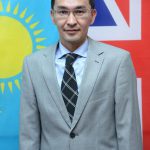
Aslan Tanekenov
(Kazakh) Әлеуметтік ғылымдар факультетінің мемлекеттік басқару кафедрасының ассистент-профессоры
More:
Assistant Professor, Department of Public Administration, College of Social Sciences
Dr. Tanekenov obtained his PhD degree from Heriot-Watt University, UK and MPhil degree from University of Glasgow, UK. His research interests are International civil society organizations; social enterprise, empowerment of socially vulnerable people; cross-sector partnership; volunteering, philanthropy, NGO management.
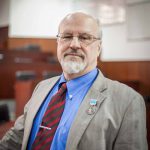
Dennis Soltys, Ph. D. in Political Science
Adjunct Professor,
Department of Public Administration/College of Social Sciences
More:
Professor Dennis Soltys obtained his PhD from the Department of Political Science, University of Toronto.
He has served on many KIMEP committees, especially concerning accreditations and quality assurance, and is currently the chair of the Department of Public Administration and International Development.
In his 15 years at KIMEP Dr. Soltys has taught a wide variety of courses, including graduate courses in research methods and thesis-writing, public policy of Kazakhstan, comparative education policy, and organization theory. He has publications in top international journals such as Journal of Central Asia, Comparative Education, International Journal (Canada) and Foreign Policy (USA), complemented by numerous conference papers published in Kazakhstan.
His main research interests include the cultural foundations and systemic design of public education in developed and transitional countries, development of civil society in transitional countries, and the public policy of Kazakhstan.
Email: dsoltys@kimep.kz
Tel. (727) 270-4303
Research and Publications:
Soltys, D. (2017). Social transformation with conflict avoidance in Ukraine between the maidans of 2004 and 2014. Post-Soviet Affairs, USA, (submitted, September, 2017).
Soltys, D. (2017). The central role of humanities and social sciences education in powering economic innovation. Vcheni zapysky (Scientific Notes), Kyiv, (forthcoming, July 2017).

Milen Nikolaev Filipov
Assistant Professor, Department of Media and Communication/College of Social Sciences
More:
Research and Publications:
Filipov. M. et. al. (2017). Do Bulgarian Schools Effectively Communicate with Their School Communities? Journal of School Public Relations, 37(2):163-202.
Filipov. M. (2016). Media Release – A Basic Genre in Public Relations. Journal of Contemporary Humanitaristics, 2016(1): 7-18. (co-authorship with Galya Hristozova).
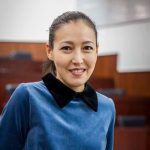
Aigerim Kalybay, Ph. D.
Professor, Department of Economics/College of Social Sciences
More:
Aigerim Kalybay is an Associate Professor at the Department of Economics. After graduating from L.N. Gumilyov Eurasian National University in 1998 she received a research fellow position at the Institute of Mathematics of the Academy of Sciences of the Republic of Kazakhstan. She worked at the Institute of Mathematics for six years, during which in 2002 she attained the degree of Candidate in Physical and Mathematical Sciences. In 2004 she received a grant from the Royal Swedish Academy of Sciences for a two-year postgraduate study at the Luleå University of Technology, where she defended her PhD Thesis in 2006. In the same year she joined KIMEP.
Please also update
Courses taught: Mathematics for Business and Economics, Introduction to Statistics, Calculus, Quantitative methods for Economics, Quantitative Data Analysis, Statistical methods.
Selected Publications:
- A. Kalybay, “One-dimensional differential Hardy inequality”, Journal of Inequalities and Applications, 2017, 2017:21; http://dx.doi.org/10.1186/s13660-017-1293-3 (Published: January 2017).
- A. Kalybay, D. Karatayeva, R. Oinarov, A. Temirkhanova, “Oscillation of a second order half-linear difference equation and the discrete Hardy inequality”, Electronic Journal of Qualitative Theory of Differential Equations, # 43, 2017, 1-16; doi: http://dx.doi.org/10.14232/ejqtde.2017.1.43 (Published: May 2017).
- A. Kalybay, S. Shalginbayeva, “Additive estimates for discrete Hardy-type operators”, Eurasian Mathematical Journal, Vol. 9, #2, 2018, 44-53 (Published: June 2018).
- A. Kalybay, R. Oinarov, “Kernel operators and their boundedness from weighted Sobolev space to weighted Lebesgue space”, Turkish Journal of Mathematics, Vol. 43, 2019, 301-315; http://dx.doi.10.3906/mat-1807-187 (Published: January 2019).
- A. Kalybay, R. Oinarov, A. Temirkhanova, “Integral operators with two variable integration limits on the cone of monotone functions”, Journal of Mathematical Inequalities, Vol. 13, #1, 2019, 1-16; http://dx.doi.10.7153/jmi-2019-13-01 (Published: March 2019).
- A. Kalybay, R. Oinarov, “Estimates of a class of quasilinear integral operators on the set of nonnegative and nonnegative-monotone functions”, Izvestiya: Mathematics, Vol. 83:2, 2019, 61–82; http://dx.doi.org/10.4213/im8613 (Published: March-April 2019).
- A. Kalybay, “Weighted estimates for a class of quasilinear integral operators”, Siberian Mathematical Journal, Vol. 60, # 2, 2019, 291–303; http://dx.doi.org/10.1134/S0037446619020095 (Published: March-April 2019).

Kanat Kudaibergenov, Doctor of Science
Adjunct Professor, Department of Economics/College of Social Sciences
More:
Research and Publications:
Kudaibergenov, K., (2016). On model-theoretic properties in the sense of Peretyat’kin, o-minimality, and mutually interpretable theories. Siberian Advances in Mathematics. ISSN: 1055-1344, vol. 26, No. 3, 190 – 195.
Kudaibergenov, K. (2017). The small index property and the cofinality of the automorphism group. Siberian Advances in Mathematics. ISSN: 1055-1344, vol. 27, No. 1, 1 – 15.

Kristopher White, Ph.D. Geography
Associate Professor, Department of Public Administration/College of Social Sciences
More:
Faculty Profile
- Kristopher D. White
- Associate Professor
- D. Geography, (2002) University of Connecticut
MA Geography, (1996) University of Connecticut
BA Geography, (1992) Clark University
- Teaching Experience: Has been at KIMEP since 2004
Stephen F. Austin State University (Nacogoches, Texas) (2001-2004)
University of Connecticut (Storrs, Connecticut) (1998-2001)
- Classes taught at KIMEP:
Globalization and Diversity
Population and Environment
Human Geography
The Aral Sea Crisis: A Geographical Perspective
Political Geography
Ecology and Sustainable Development
Oil Geopolitics (Graduate seminar)
Oil and Gas Policy
Introduction to Environmental Studies
Digital Photography
Photojournalism
Natural Resource Management and Economics
Research Reading and Writing
- Research Interests:
Geography of Central Asia, Kazakhstan. Regional economy, Aral Sea region, Aral Sea crisis and contemporary socio-economic development in Aral Sea region. .
- Selected Recent Publications
White, K.D. and Micklin, P. 2021. Ecological restoration and economic recovery in Kazakhstan’s Northern Aral Sea region. Focus on Geography 64: doi: 10.21690/foge/2021.64.4f.
White, K.D. 2021. Population, Development, and Environment in Kazakhstan. In: McNicol, B. ed. Sustainable Planet: Issues and Solutions for Our Environment’s Future. Santa Barbara, CA: ABC-CLIO, pp. 29-37.
Micklin, P., Aladin, N.V., Chida, T., Boroffka, N., Plotnikov, I.S., Krivonogov, S., and White, K. 2020. The Aral Sea: A story of devastation and partial recovery of a large lake. In: Mischke, S. ed. Large Asian Lakes in a Changing World: Natural State and Human Impact. Switzerland AG: Springer Nature, pp. 109-141.
White, K.D. 2019. Environmental Issues in Kazakhstan. In: Farazmand, A. ed. Global Encyclopedia of Public Administration, Public Policy, and Governance (Switzerland: Springer Nature).
White, K.D. 2019. Visualizing the languages of nature, society, power and politics in contemporary Kazakhstan. In: Brunn, S.D and Kehrein, R. eds. Handbook of the Changing World Language Map (New York: Springer Nature).
White, K.D. 2018. The snow leopard and cultural landscape in contemporary Kazakhstan. Society and Animals 26: 1-23.
Koch, N. and White, K. 2016. Cowboys, gangsters, and rural bumpkins: Constructing the ‘other’ in Kazakhstan’s ‘Texas.’ In: Laruelle, M. ed. Kazakhstan in the Making: Legitimacy, Symbols, and Social Changes. Lanham: Lexington Books, pp. 181-207.
White, K.D. 2016. Kazakhstan’s Northern Aral Sea today: Partial ecosystem restoration and economic recovery. In: Freedman, E. and Neuzil, M. eds. Environmental Crises in Central Asia: From steppes to seas, from deserts to glaciers. London and New York: Routledge, pp. 129-140.
White, K.D. 2014. Nature and Economy in the Aral Sea Basin. In: Micklin, P., Aladin, N., and Plotnikov, I. eds. The Aral Sea: The devastation and partial rehabilitation of a great lake. Berlin Heidelberg: Springer-Verlag, pp. 301-335.
White, K.D. 2013. A geographical perspective on the Aral Sea crisis: Three interpretations of an image. Bulletin of Geography Socio-economic Series 21: 125-132.
White, K.D. 2013. Nature-Society Linkages in the Aral Sea Region. Journal of Eurasian Studies 4(1): 18-33.
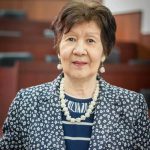
Aliya Nurtaeva, Ph. D. in Chemistry
Adjunct Professor, Department of Public Administration/College of Social Sciences
More:
Dr. Nurtaeva holds an Honors Diploma (1974) and Candidate of Science degrees in Chemistry from Moscow State University (1979 and a Ph.D. in Chemistry from Oklahoma State University (1999). She has more than 30 years of teaching experience including at Al-Farabi Kazakh National University, Oklahoma State University, New Hamphire Technical College, Southern New Hampshire University. She has done research in Chemistry, Technology and Radiation Dosimetry at KazGU, Moscow State University, Oklahoma State University and the Armed Forces Radiobiology Research Institute at National Naval Medical Center in Bethesda (USA) and registered 17 patents.

Nurseit Niyazbekov, Ph. D. Politics
Assistant Professor, Department of International Relations and Regional Studies/College of Social Sciences
More:
Dr Nurseit Niyazbekov is an assistant professor in the Department of International Relations in KIMEP University in Almaty, Kazakhstan. He is researching and consulting various international media and think tanks in the areas of post-communist transitions, democratization, Central Asian state building and protest mobilization. He was a visiting research fellow at the University of Michigan and SciencePO. He obtained his PhD and MSc degrees in Politics and Sociology from the University of Oxford.

Nadeem Naqvi, Ph. D.
Professor, Department of Economics/College of Social Sciences, College of Social Sciences
More:
Research and Publications:
Naqvi, N., & Egbert, H. (2015). Market-Dependent Domestic Production Set. Journal of Economics and Finance Education, 14 (1), 31-40
Naqvi, N. (2017). Production Possibility Frontier: New Concepts for Post-Crisis Economics Textbooks in Ploehn, Juergen and George Chobanov (Eds.), Sustainability and Welfare Policy in European Market Economies, Peter Lang, pp 11-12.

Gerald Pech, Doctorate of Economics
Associate Professor, Department of Economics/College of Social Sciences
Dean, College of Social Sciences
More:
Gerald Pech held teaching and research positions at the Graduate School Bochum and Dortmund, the University of St Andrews, National University of Ireland in Galway, American University in Bulgaria and Johannes-Gutenberg University Mainz. His fields of specialization are game theory, public economics and the economic analysis of institutions.

Francis Amagoh, Ph. D. in Public Policy and Administration
Professor, Department of Public Administration/College of Social Sciences
More:
Research and Publications:
Amagoh, F. (2017). Healthcare in Kazakhstan in The Future of Healthcare in Developing Countries in Asia( Eds. C. Aspalter and K. Pribadi). London: Routledge/Taylor & Francis.
Amagoh, F., & Rahman, T. (2016). Tapping into the Potential of Academic Diaspora for Homeland Development: The Case of Nigeria. Journal of International Migration and Integration .Vol. 17 No. 1, 35-53.

Nygmet Ibadildin, Ph. D. in Political Science and International Relations
Chair of the Department of International Relations and Regional Studies, Department of International Relations and Regional Studies/College of Social Sciences
More:
Nygmet Ibadildin graduated in 1995 from Kazakh State University with major in Philosophy. He made his Master of Arts in International relations in California State University at Fresno. He defended his PhD dissertation in 2011 in University of Tampere, School of Management. Title of dissertation is Role Of New And Old Institutional Framework In Combating The Resource Curse In Kazakhstan”. Dissertation grade is Magna cum laude approbatur.
He was editor and journalist in the Energy of Kazakhstan magazine and in the newspaper Vremya Po form 1999-2002.
Worked in different schools in Kazakhstan and abroad.
Research interests are political economy of natural resources, institutional development, Post-Soviet institutions and discourse analysis.
Currently teaching in KIMEP University, Almaty, Kazakhstan.
Research and Publications:
Ibadildin, N. (2012). Role of institutions in Kazakhstan in combating the resource curse: Transition from the Soviet legacy to something else. London: Lambert Academic Publishing.
Ibadildin, N. (2009). Oil and Authoritarianism in Kazakhstan, in Ostrov, B. (Ed.) From Silk Road to Oil Slick: Kazakhstan Reemergence to Modernity. Norwalk: EastBridge.
List of Publications
Charles McGrath, Nygmet Ibadildin. Kazakh Famine 1928-1932. Publication date.2018/5. Journal Ukrainian Policymaker, Volume 2, 2018: 12-19 DOI: 10.29202/up/2/2
Ken Harvey and Nygmet Ibadildin. Handbook of Research on Human Social Interaction in the Age of Mobile Devices, scheduled for publication in 2016 by IGI Global, Chapter Mobile Impacting All Phases of Business IGI Global 2016
Ken Harvey and Nygmet Ibadildin. Business and mobile: Rapid restructure required June 2016 DOI: 10.4018/978-1-5225-0469-6.ch014
Нефть и политика. Мировой опыт и Казахстан. Казакпарат: Алматы 2015 in Russian
Role Of New And Old Institutional Framework In Combating The Resource Curse In Kazakhstan. Acta Universitatis Tamperensis 1600, Tampere 2011
Role of institutions in Kazakhstan in combating the resource curse
Transition from the Soviet legacy to something else
2011
LAP Lambert Academic Publishing
292 p
Oil and Authoritarianism in Kazakhstan, Chapter for the book From Silk Road to Oil Slick: Kazakhstan Reemergence to Modernity, Edited by Ben Ostrov. Norwalk: EastBridge 2009
Resource Curse avoidance policies in Kazakhstan: issues, debates, difficulties in implementation in The Exploitation Of The Landscape Of Central And Inner Asia: Past, Present And Future Edited by Michael Gervers, Uradyn E. Bulag, Gillian Long, Toronto Studies in Central and Inner Asia, No. 9 Asian Institute, University of Toronto
Toronto, 2008
Kazakhstan. Article for the Routledge Encyclopedia of adolescence, 2007
“Concepts of Political Development and Modernization”, Poisk, Research journal of the Ministry of education and science 2003, 4 (Part II)
“Concepts of Political Development and Modernization”, Poisk, Research journal of the Ministry of education and science 2003, 4 (Part I)
“Historical and Country Lessons in Oil Development”, Poisk , Research journal of the Ministry of education and science 2002 , 4
“Interdependence Of Oil And Politics In Kazakhstan”, Poisk , Research journal of the Ministry of education and science 2002 , 3
“The Great Game. History and today”, Vestnik Vishei Shkoly Kazakhstana, 2002, 1, Almaty
“World Best Practice for Petroleum Fund and Kazakhstan’s Variant”, Poisk , Research journal of the Ministry of education and science 1,2002, p.152-156
“Some Positive and Negative Aspects of Oil Development in Kazakhstan”, Poisk , Research Journal of the Ministry of Education and Science №6, 2001, p.215-218
“International aspects of oil production in Kazakhstan”, Kazakhstan and World Community: Collection of the Articles, edited by M. Zholdasbekov Almaty: Dyke-press, 2000. p.134-143
“What are the Price Determinants for Oil Markets” Materials of the International Conference held by Diplomatic Academy, Astana, January 18-19, 2001 TACIS, FINEK.
“Some Implications of the Recent Constitutional Changes in Kazakhstan”, Working Papers. Symposium: Politics, Economics and Ideology in Kazakhstan, Research Center Almaty, Kazakhstan, KIMEP, 1999, pp. 130-134
“Philosophy and Idealism” Poisk , Research Journal of the Ministry of Education and Science 1999, 1, p.194-199, Almaty,
“Realist, Interdependent and World Systems theories as Explanatory Models of International Relations” Higher Education in Kazakhstan. 1999, 1, pp.119-124, Almaty
“The Economic Miracle and Its Rational Explanations” Poisk, Research Journal of the Ministry of Education and Science. 1998, 3, pp.198-201, Almaty,
“Philosophy as an Apophatic Phenomenon of the Consciousness” Mysl, Republican journal on social and political issues 1998, 6, pp.18-23, Almaty,
“Liberalization in Kazakhstan. Part 1.”, Vestnik Vishei Shkoly Kazakhstana ,1998, 4, pp.135-141, Almaty
“Liberalization in Kazakhstan. Part 2.”, Vestnik Vishei Shkoly Kazakhstana 1998, 5, pp.94-106, Almaty
“Truth. Beauty and Common Good”, Mysl, Republican journal on social and political issues
1998, 6, pp.36-38, Almaty,
“Some Peculiarities of Philosophical Discourse”, Poisk , Research Journal of the Ministry of Education and Science 1998, 3, pp.191-192, Almaty,
“Relationship between Political and Military Elites in Russia”, Vestnik Vishei shkoly Kazakhstana, 1996, 4, pp. 65-70, Almaty
“Kataphatic Definition of Philosophy”, Methodical Recommendations Almaty, “Kazakh Universiteti”, 1997 pp.3-17
“Economic and Political relations of Kazakhstan with Russia, China and United States”, Vestnik Vishei Shkoly Kazakhstana , 1997, 4, pp.75-82, Almaty
“Sino-American Relations” Materials of the First International Scientific Conference on the Role of Sociology, October 23-24 1996, pp.158-167, Almaty, 1997
“Kataphatic Definition of Philosophy” Vestnik Vishei Shkoly Kazakhstana , 1996, 5, pp.114-124, Almaty
“Apophatic Definition of Philosophy”, Vestnik Vishei Shkoly Kazakhstana 1996, 4, pp. 71-81, Almaty
Patents
US Patent PCT/US 2013/049188 Bentonite collars for wellbore casings Craig Benson, Ivan Kornienko, Nygmet Ibadildin – US Patent App. 13/542,390, 2012 WO 2014008325 A1 United States Patent US009080419B2 (12) (10) Patent No.: US 9,080,419 Date of Patent: Jul. 14, 2015
Номер патента: 30703. Узел обсадной трубы и способ изоляции зазора между обсадной трубой и стенкой ствола скважины.. Опубликовано: 15.12.2015. Авторы: Бэнсон Крэг Х., Ибадильдин Ныгмет Амангельдинович, Корниенко Иван Викторович
МПК: E21B 43/10, C09K 3/18, E21B 17/01
Kazakhstan Patent No16322, Е21В 33/14, 14.10.2005 Сушко Сергей Михайлович, Бегун Анатолий Данилович, Ибадильдин Ныгмет Амангендинович, Корниенко Иван Викторович. Способ заканчивания технологических скважин и конструкция герметизирующего стакана
Kazakhstan Patent No15117, 15.12.2004 Цирельсон Людмила Екимовна, Ибадильдин Ныгмет Амангендинович Способ лечения диарейных заболеваний
Kazakhstan Patent No 14313, 05.05.2004 Цирельсон Людмила Екимовна, Ибадильдин Ныгмет Амангендинович Способ получения адсорбирующего средства из коллоидных глин
Kazakhstan Patent No 13071, 15.05.2003 Бухман Михаил Александрович, Ибадильдин Ныгмет Амангендинович Распылительная сушилка
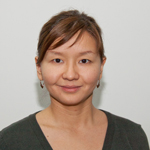
Sholpan Kozhamkulova, Ph.D.
Assistant Professor and Chair, Department of Media and Communications/College of Social Sciences
More:
Currently, Sholpan is on leave to study towards her PhD in Journalism Studies at the University of Maryland. Sholpan Kozhamkulova graduated from Kazakh National University with a BA in Journalism in 2000. She earned an MA in Translation Theory from Abylay Khan Kazakh State University in 2002, an MA in Journalism and Public Affairs from the American University in Washington DC in 2004 and a PhD in Political Communications from KazNU in 2008. Her career includes work as an editor at “Aykos” and teaching positions at Abylay Khan University and KazNU.
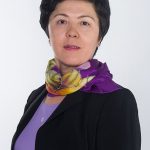
Saltanat Kazhimuratova, M.A. in International Journalism
Senior Lecturer, Department of Media and Communications, College of Social Sciences
More:
Professional journalist, experienced instructor, has been working at KIMEP University since 2003. Graduated from the Advanced training program for faculty of the University of Michigan (USA) and Lund University (Sweden). Member of the Thomson Foundation Editors’ Program, Cardiff, UK. Speaker at international conferences in Germany, Hungary, Turkey, Malaysia, and Spain. Member of the European Communication Research and Education Association (ECREA). Presented at the UNESCO session on journalism education as an expert. Shared her positive experience of teaching journalism at KIMEP University and spoke about the processes of globalization of journalism education in Kazakhstan. Completed an internship for journalists in the USA, got acquainted with the work of the ABC News, The Washington Post, Discovery TV channel and other US media.
Lectures on journalism and mass communications, supervises students’ internships, and coordinates department’s communications with professional communities. Has developed new courses, for example, Fashion and Lifestyle Journalism. Created a practical laboratory for students, where practicing journalists, PR specialists and other media specialists regularly conduct trainings and master classes.
Awarded with the Y. Altynsarin breastplate from the Ministry of Education and Science of the Republic of Kazakhstan. Author of one of the chapters of the first in Kazakhstan textbook on media literacy for university faculty. “The best faculty for 2016-2017” award.
Facebook: https://www.facebook.com/saltanat.kazhimuratova/
Portfolio: https://newreporter.org/author/saltanat/
E-mail: saltanat@kimep.kz
Phone.: +7 (727) 270-42-96
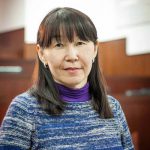
Alma Kudebayeva, Ph. D.
PhD, Professor, Department of Economics/College of Social Sciences
More:
Faculty profile
- Faculty name: Alma Kudebayeva
- Position at KIMEP: Assistant professor, Research Director of CSS
- Education: PhD in Development Economics from the University of Manchester (UK); PhD in Mathematics from KazNU named Al-Farabi (Kazakhstan),
- Experience (teaching / professional)
2020- current Research director of College of Social Sciences, KIMEP University
2004 – current Assistant Professor, KIMEP University.
2015 Teaching assistant at the Institute of Development Policy and Management, the University of
2010- 2011 Research Fellow at the German Institute for Economic Research (DIW) by the Erasmus Mundus Program
2003 –2004 Research Fellow of the Fulbright Program, Indiana University
2001 – 2003 Associate Dean of the college of Economics and Business, Kazakh State National University (KazNU), Kazakhstan
2001-2003 Associate Professor (part-time), International Academy of Business (Almaty)
1995- 2001 Senior Lecturer, KazNU
1992-1995 Lecturer, KazNU
- Classes taught
Principles of microeconomics, principles of macroeconomics, econometric methods, advanced econometrics, financial econometrics, quantitative methods in economics, managerial economics, mathematical economics, economy of Kazakhstan, internship for undergraduate students and graduate students, Research seminar, special topic in economics, thesis seminar, research methods and methodology.
- Research interest: Poverty, inequality, well-being, labour economics, BRI, Central Asia.
- Recent/top publications (with active links)
Reza Arabsheibani, Alma Kudebayeva, Altay Mussurov (2021) “Note on Bride Kidnapping and Labour Supply of Kyrgyz Women”. Economic Systems. https://doi.org/10.1016/j.ecosys.2021.100885
Kudebayeva, A., Sharipova, A., & Sharipova, D. (2021). Social Capital and Subjective Well-Being in Central Asia. Europe-Asia Studies, 1–24. https://doi.org/10.1080/09668136.2021.1973965
Primiano, C. B., & Kudebayeva, A. (2020). What is democracy and who supports it? Findings from a university survey in Kazakhstan. Central Asian Survey, 39(4), 463–479. https://doi.org/10.1080/02634937.2020.1823318
Barrientos, A., and Kudebayeva, A., (2018) “Social Transfers and Women’s Labour Supply in Kyrgyzstan” IZA Institute of Labor Economics, GLM|LIC Working Paper No. 41. https://conference.iza.org/conference_files/GLMLIC_Nepal2019_Conference/kudebayeva_a8594.pdf
Kudebayeva, A., & Barrientos, A. (2017). A Decade of Poverty Reduction in Kazakhstan 2001–2009: Growth and/or Redistribution? Journal of International Development, 29(8), 1166–1186. https://doi.org/https://doi.org/10.1002/jid.3278
Brück, T., Esenaliev, D., Kroeger, A., Kudebayeva, A., Mirkasimov, B., & Steiner, S. (2014). Household Survey Data for Research on Well-being and Behavior in Central Asia. Journal of Comparative Economics, 42(3), 819–835. https://doi.org/http://dx.doi.org/10.1016/j.jce.2013.02.003

Eldar Madumarov, Doctorate in Economics
Chair, Department of Economics/College of Social Sciences
More:
Research and Publications:
Alimbekov, A., Madumarov, E., & Pech, G. (2017). Sequencing in Customs Union Formation: Theory and Application to the Eurasian Economic Union. Journal of Economic Integration 32.
Madumarov, E. (2008) External Factors of Economic Growth: Transition Economies of the Baltics and Central Asia. VDM Verlag, Saarbrücken, August 2008. (Book).
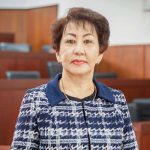
Aliya Kabdiyeva, MPhil
Adjunct Assistant Professor, Department of Public Administration/College of Social Sciences
More:
Research and Publications:
Kabdiyeva, A. (2015). Development of NGOs in Kazakhstan. European Journal of Business and Social Sciences 4 (2), pp. 159-169.
Dixon, J., Kabdiyeva A. (2014). Collaboration between the State and NGOs in Kazakhstan. International Journal of Community and Cooperative Studies 1(1), pp. 27-41.
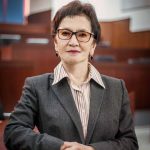
Azhar Baisakalova, Ph. D.
DBA, Adjunct
Assistant Professor, Department of Public Administration/College of Social Sciences
More:
Research and Publications:
Baisakalova A.B. (2015). Grounded Action Research: Systems Thinking Approach to Promoting CSR in Kazakhstan. Abstracts of the Papers Presented at the ISSS2015 International Conference “Governing the Anthropocene: The greatest challenge for systems thinking in practice?” pp.131-132. Humboldt University, Berlin, Germany, 2-7 August, 2015, ISBN: 978-1-906740-13-9.
Baisakalova A.B. (2016). Responsible Business and Social Entrepreneurship in Kazakhstan. Chapter in the book: The World Guide to Sustainable Enterprise (ed. Wayne Visser), v. 2, 78-83. Greenleaf Publishing. ISBN-13: 978-1-78353-462-3.
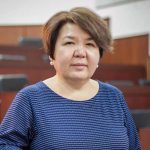
Gulnara Dadabayeva
Professor, Department of International Relations and Regional Studies
Phone: 270-42-79, 270-42-88 ext. 3077
Office:129 /ac
E-Mail: dgulnara@kimep.kz
More:
Professor
Education:
D.Sc. (Historical Sciences), Kazakh National University named after Al-Farabi, Kazakhstan
Work experience:
2005 – present, Assistant Professor, Department of Political Science and International Relations, KIMEP, Kazakhstan
1987 – 2005, Lecturer, Department of History,in Kazakh National University named after al-Farabi, Kazakhstan
Primary teaching areas and teaching experience:
History of Kazakhstan, “Nation-state building in Asian Republics of Soviet Union” ”Government and Politics in Central Asia”, ”Central Asian – Russian Relations”, “History of Diplomacy from 1648 to 1815”, “History of Diplomacy from 1815 to 1945”
Research interests:
Nationalism and nation-state building processes in modern Central Asia.
Selected publications:
Articles
Post-Soviet Kazakhstan: Nationalism and Language Issues. The Soviet and Post-Soviet Review, vol. 37 no. 2 2010, Brill The Netherland, ISSN 1075-1262, e-ISSN 1876-3324 (co-author A. Adibayeva)
Kazakh Nationalism in Eurasian Context. History Research, vol.2, Number 7, July 2012. USA, David Publishing Company, ISSN 2159-550X, ISSN 2159-5518.
El Nasionalismo Kazajo en el Contexto Eurasia Tico, Eurasiatica Revista Online Sobre Asia Central, 2011, 2
Post-Crisis World: The Chinese Factor in The Transformation of Kazakhstan” , co-author A. Adibayeva (submitted for publication by Journal of South Asian and Middle Eastern Studies (USA)
Problems of Refugees from Central Asia as Consequences of Stalin’s Modernization [Проблема Беженцев из Центральной Азии, как Последствия Сталинской Модернизации], Vestnik KazNU, Seriya Istoricheskaya, 2009, 2 (31): С. 11-18
Nationalism in Modern Kazakhstan Language Policy, Otan Tarihy, 2009, 2: 54-63
The Peculiarities of “Russification Processes” in SovietRepublics and Kazakh Language Problems [Особенности Процесса «Русификации» в Советских Республиках и Проблемы Казахского Языка], Аlash, 2009, 1 (22): 104 – 111
Kazakhstan – Russian relations in 2000-s geopolitical context (p. 21-27)// Kazakh civilization, # 3, 2012.
“Great Powers Politics in Central Asia in 2000-s: The New “Great Game”? // KazNU Herald [Вест. КазНУ, сер ист.] – 2013 – №3 (70).- с. 96-103.
Book chapters
“Mackinder’s legacy today: new challenges for Kazakhstan and Central Asia” in Central Asia in International Relations, ed. by Nick Megoran & Sevara Sharapova, Hirst and Co, London, 2013. (co–author A. Adibayeva)
Государственная языковая политика в независимом Казахстане: внешне- и внутриполитические факторы.(с. 270-282) –/ Центральная Азия. Традиции и современность. Под ред. А.О. Чубарьяна. Институт всеобщей истории РАН РК.- Москва, 2011.- 330 с. ISBN 978-5-94067-326-2.
Нациестроительство в Центральной Азии: от советских наций к постсоветским нациям-государствам.(с. 295-317) /Центральная Азия. Традиции и современность. Под ред. А.О. Чубарьяна. Институт всеобщей истории РАН РК.- Москва, 2011.- 330 с. ISBN 978-5-94067-326-2.
Kazakhstan during civil war [Казахстан в годы гражданской войны] //History of Kazakhstan since ancient times to nowadays [История Казахстана с древнейших времен до наших дней (курс лекций)]. – Алматы: Уш Киян, 2003. – С. 360-382.
Textbooks
- The Modern History of the World [Новейшая История Мира (Учебник для 9 классов 12-летних Школ)], (with G. Kokebayeva, M.Baisymakova), Mektep, Almaty, 2011
- The Modern History of the World (Reading Materials Collection), [Новейшая История Мира] (Хрестоматия для 12-летних Школ), (with G. Kokebayeva, M.Baisymakova), Mektep, Almaty, 2011
Conference presentations
- Russia and Kazakhstan: Searching for a New Partnership in 2000s, The Dragon and the Bear: Strategic Choices of China and Russia, 11th Aleksanteri Conference, Helsinki, Finland, November 2011
- Kazakh Nationalism in Eurasian Context, CESS XII Annual Conference, Ohio State University, USA, September 2011
- Nationalism Issues in Language Policy of Modern Kazakhstan, ICCEES XIII World Congress, Stockholm, Sweden, 2010
- The Issues of Nationalism in Kazakhstan Language Policy, Osnovnite Problemi na Sovremenna Nauka, International Conference, Sofia, Bulgaria, 2009: 29-34
- The Establishment of State Nationalism in Independent Kazakhstan, Strategiczne Pytania Awiatowej Nauki, International Conference, Przemysl, Poland, 2009: 72-78
Involvement in academic and professional associations:
Member of “Kazakhstan Historians” Association.
Member of Central Eurasian Studies Society (USA).
Contact info:
Phone: 270 42 79/88, ext 3077
Office: 129 Valikhanov bld.
E-Mail: dgulnara@kimep.kz
Application for the academic rank of professor

Aigul Adibayeva
Associate Dean, College of Social Sciences
Candidate of Science
Phone: 270-42-79, 270-42-88 ext. 3275
Office: 130/ac
E-Mail: aigula@kimep.kz
More:
Assistant Professor/Associate Dean/College of Social Sciences
Education:
Candidate of Science in Political Science, Almaty State University named of Abay, Kazakhstan, 2009
Primary teaching areas and teaching experience:
Areas: Political Science, International Relations
Teaching experience: 12 years
Courses taught at KIMEP:
-Fundamentals of Political Science
-Foreign Policy of Kazakhstan
-Russia-Central Asia Relations
-Ethics in International Affairs.
– Management of International Organizations
Research interests:
Research experience involves the following areas: Central Asian integration, issues in foreign policy of Kazakhstan, political and economic situation in Turkmenistan, Caspian region.
Joint Research and Curriculum Development Project “Excellence in Teaching on Global Business and International Relations” with Agder University (Norway), with support from the Norwegian Centre for Cooperation in Education (SIU) in May 2012-2014; curricular development and teaching the course of “Ethics in IA”.
Selected publications:
- A. Adibayeva, D. Saari, A. Tleuzhanova (2016). To the Question of Legal Regulations of International Trade in the Context of Multi-dimensional Diplomacy. International Economic Law, issue 1, Moscow, November, 2016.
- J. Melich, A. Adibayeva. Nation-building and Cultural Policy in Kazakhstan. European Scientific Journal, ISSN: 1857 – 7431, December 2013, special edition, vol. 2, pp.265-279.
- G. Dadabayeva, A. Adibayeva: A Post-Crisis World: The Chinese Factor in the Transformation of Kazakhstan. Journal of South Asian and Middle Eastern Studies, Villanova University, Villanova PA, issue XXXVII no. 2, 2013.
- “Kazakhstani-Turkmenistan Relations at Modern Stage”, chapter in the edited book Historical Dictionary of Kazakhstan. Scarecrow Press Inc. Lanham, Toronto, 2012.
- A. Adibayeva (co-authored with G. Dadabayeva). “H. Mackinder’s Legacy Today: New Challenges for Kazakhstan and Central Asia”, – a chapter in the edited book: H. Mackinder and the International Relations in Central Asia (Editor: Nick Megoran)//Published by: C Hurst & Co Publishers Ltd., London, ISBN-13: 978-1849042437/ December 2012.
- A. Adibayeva, (co-authored with G. Dadabayeva) “Post-Soviet Kazakhstan: Nationalism and Language Issues”, published in peer-reviewed journal The Soviet and Post-Soviet Review, volume 37, No.2, 2010, p. 127-141. – BRILL, the Netherland.
Contact info:
Phone +7(727) 270-43-12 (ext. 3189)
Office: 205 A Valikhanov bld.
E-Mail: aigula@kimep.kz
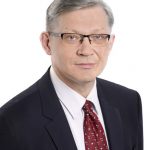
Vladimir Ryzhkov
Professor of Research, Department of International Relations and Regional Studies
More:
PhD degree in History, North-Western Institute of Management – a branch of the Russian Academy of National Economy and Public Administration under the President of the Russian Federation.
The dissertation title of his doctorate is “Political regime and institutions of Russia in the 1990s.” The dissertation was published as a book “The Fourth Republic” (2000).
Dr. Ryzhkov’s been participating in social and political activities in the democratic movement in Russia since 1987. He worked as a Vice-Governor of the Altai Region in the new democratic administration.
In 1994 – 2007 was a Deputy of the State Duma of Russia 1-4 convocations.
Since the spring of 2000 Dr. Ryzhkov was in opposition to the policies of Vladimir Putin. He worked closely together with Boris Nemtsov, Mikhail Kasyanov, Garry Kasparov and others.
Since 2007 Dr. Ryzhkov’s been a columnist and host of several programs at the independent radio Ekho Moskvy, “The Moscow Times” daily newspaper.
Since 2007 – Professor at the National Research University Higher School of Economics (HSE) teaching courses on the history and theory of European integration and the study of the Euro-Atlantic region.
Author of several books including “The Fourth Republic” (2000), “Gift of Democracy” (2006), 6 books on the history of World War II and two big volumes about Altai.
Contact information: office # 127 Valikhanov building
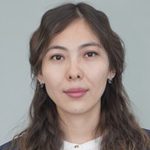
Assylzat Karabayeva
Assistant Professor, Department of International Relations and Regional Studies
More:
PhD in International Relations from the International University of Japan, Japan
Master of International Law and Economics, World Trade Institute, University of Bern, Switzerland
Bachelor of International Relations, Suleiman Demirel University, Kazakhstan
Visiting scholar at George Washington University’s Institute for European, Russian and Eurasian Studies
Courses taught at KIMEP: “Ethics in International Affairs”; “Theories of International Relations” and “Comparative Foreign Policy”
Research interest: Role of norms (ideas, identity, and culture) in both constraining and strengthening region-building processes in Eurasia.
Contact information: office # 117 Valikhanov building

Scott Burgess
Assistant Professor, Department of Media and Communications
More:
Mr. Scott Burgess, new Assistant Professor at the Department of Media and Communications, CSS, joined KIMEP in Fall 2023. Currently he is teaching courses: Advanced Media Writing; Editing and Communication Research.
Education:
PhD candidate at Wayne State University, USA
MA, Wayne State University, Detroit, USA
Bachelor degree from UCLA, USA
Research interests: perceptual biases in mass media including Hostile Media Effect and Third Person Effect and how the media can exacerbate these effects. He’s also interested in examining problems new journalists encounter when beginning their careers
Scott Burgess is a former journalist with more than three decades of experience. He has worked at small and large newspapers as a reporter and editor. He was the Middle East Bureau Chief for Stars & Stripes covering conflicts in Bosnia, Kosovo, Iraq, and Afghanistan. He was the Auto Critic at The Detroit News and the Detroit Editor at Motor Trend.
Contact information: office # 511 Valikhanov building

